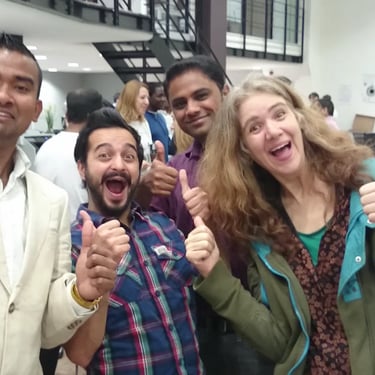Understanding the Programming: How Society Shapes Financial Beliefs
Society plays a pivotal role in shaping individual financial beliefs and behaviors, often fostering a middle-class mindset that perpetuates economic stagnation. Cultural narratives, deeply embedded in our social fabric, propagate ideas about wealth, success, and the value of hard work. These narratives often glorify stability over risk-taking, leading to a pervasive belief that financial security is unattainable unless one follows a traditional path. This mentality can limit aspirations, as individuals start to perceive financial freedom as a distant dream reserved for a select few.
Moreover, the education system contributes significantly to this psychological programming. Many curriculums prioritize rote memorization and standardized testing over financial literacy. As a result, students receive little to no training on managing personal finances, entrepreneurship, or wealth generation. This lack of practical knowledge can lead to confusion and fear when faced with financial decisions, reinforcing a belief that wealth creation is a complex and unattainable process. Instead of encouraging critical thinking about money management, the educational framework often conditions students to seek stable employment rather than entrepreneurial opportunities.
Family influences also play a crucial role in shaping financial perspectives. Children often adopt the financial beliefs and behaviors they observe in their parents and guardians. If a family prioritizes job security over financial independence, children may internalize these notions, subconsciously accepting the limitations that accompany a traditional job-oriented life. The cycle continues as they raise their own children in similar environments, thus perpetuating a culture where financial mediocrity becomes the norm.
Understanding these socio-cultural influences is essential for those aspiring to break free from the constraints imposed by their surroundings. Recognizing the origins of these beliefs empowers individuals to challenge the narratives that confine them, allowing for a shift towards a more entrepreneurial mindset that values wealth generation and financial empowerment.
The Role of Consumerism in Mindset Formation
In modern society, consumerism plays a pivotal role in shaping individuals' mindsets and financial behaviors. The prevalence of consumer culture encourages people to adopt a lifestyle that often prioritizes immediate gratification over sustainable financial practices. Advertising and marketing strategies are meticulously designed to persuade consumers to purchase goods and services that may exceed their actual needs or budgets. This persistent influence fosters a mentality where living beyond one's means becomes normalized. As a result, many individuals find themselves trapped in a cycle of consumer debt and financial dependency.
Marketing campaigns frequently exploit psychological triggers to promote a sense of urgency, happiness, or belonging through possession of certain products. Terms like "limited-time offer" or "exclusive deal" create an atmosphere of scarcity, compelling individuals to make hasty purchasing decisions without considering the long-term implications on their finances. This relentless push towards instant gratification leads many to accumulate debt as they prioritize the short-lived satisfaction of a purchase over the long-term security of savings or investments.
Moreover, the societal metrics of success are often tied to material possessions. This cultural narrative promotes the notion that one's worth is tied to their ability to consume. Consequently, individuals may feel pressured to secure the latest gadgets, fashions, or luxury items, ultimately diverting their focus from foundational financial goals such as saving for retirement, purchasing a home, or investing in educational opportunities. This consumer-driven mindset not only hinders individuals from achieving wealth but also perpetuates a dependent lifestyle fueled by debt. By prioritizing consumerism, society cultivates an environment where financial challenges become a norm, and the prospect of entrepreneurship is overshadowed by the allure of instant satisfaction.
Educational Systems: The Hidden Curriculum of Financial Illiteracy
In many societies, traditional educational systems focus predominantly on academic knowledge, often at the expense of practical life skills. This approach leaves students ill-prepared for the financial realities they will encounter as adults. While subjects such as mathematics, literature, and science are essential components of a well-rounded education, the absence of courses on personal finance, budgeting, and investments creates a significant gap in the skill set necessary for achieving financial independence.
The prevailing educational model tends to prioritize rote learning and standardized testing, which can stifle critical thinking and practical application of knowledge. As a result, students may excel in theoretical concepts but struggle with fundamental financial management skills. This lack of financial literacy is particularly alarming given the ever-increasing complexity of financial products and services available in the market today.
Furthermore, schools often neglect to include discussions about debt, savings, or investment strategies in their curriculums. Instead, students may be taught to aspire only to achieve a high-paying job rather than understanding diverse paths to wealth and security through entrepreneurship or alternative financial strategies. The absence of early financial education can lead individuals to make uninformed decisions, such as accumulating excessive debt or failing to save adequately for retirement.
Among individuals who transition into adulthood without adequate knowledge of financial literacy, the repercussions can be profound. Many enter the workforce burdened by student loans or credit card debt, perpetuating cycles of poverty and limiting upward mobility. As society continues to evolve, it is crucial to recognize the role that educational institutions play in shaping financial perspectives and behaviors. By integrating financial literacy into the curriculum, we can equip future generations with the tools they need to break free from the constraints of financial illiteracy and embrace entrepreneurship as a viable path toward wealth and empowerment.
Work Culture: The Value of Stability Over Entrepreneurship
In contemporary society, there is an ingrained cultural belief that emphasizes the importance of job security, often overshadowing the potential benefits of entrepreneurship. The concept of a "stable job," typically associated with traditional employment, aligns with societal norms that prize predictability and routine over risk-taking and innovation. As a result, many individuals find themselves adhering to a career path that prioritizes safety over personal ambition. This inclination towards stability can discourage aspiring entrepreneurs from pursuing their vision, as societal expectations often frame entrepreneurship as a precarious venture fraught with uncertainties.
The pressure to conform to these norms often leads individuals to seek positions in established organizations, where benefits such as health insurance, retirement plans, and a predictable paycheck create a sense of security. While these advantages can be appealing, they can simultaneously tether individuals to a financial status quo that limits wealth accumulation and personal growth. Consequently, the fear of failure—largely propagated by societal perceptions of entrepreneurship—becomes a significant barrier. Many individuals are conditioned to view entrepreneurship not only as a risky endeavor but also as a potential loss of reputation should they not succeed. This negative perception discourages them from exploring innovative ideas or starting their own businesses, ultimately reinforcing a cycle of financial limitation.
Moreover, the narratives surrounding entrepreneurship often focus on the successful few, which can amplify the fear of failure for those contemplating this path. As societies celebrate high-profile entrepreneurs who have made fortunes, they tend to overlook countless stories of those who have taken the plunge only to fail. This can create a sense of inadequacy among potential entrepreneurs, further solidifying their adherence to the conventional work culture that emphasizes stability. Encouraging a shift in mindset—from viewing entrepreneurship as a risky venture to recognizing it as a viable path to wealth—is essential for fostering an environment where individuals feel empowered to explore entrepreneurship as an alternative to conventional employment.
Cultural Narratives: Breaking the Chains of Generational Poverty
In lower-income communities, cultural narratives often shape perceptions of wealth, success, and ambition. These narratives can create a framework that promotes the belief that financial success is unattainable for those who have been historically marginalized. Factors such as family history, community experiences, and societal messages contribute to the formation of these narratives, embedding notions of limit and resignation that can impede the aspirations of individuals.
One prevalent cultural narrative suggests that wealth is a privilege reserved for a select few. This belief can lead individuals to feel that they lack the necessary means, opportunities, or capabilities to achieve financial independence. Consequently, many members of lower-income communities may internalize self-defeating thoughts, which foster a cycle of poverty that is challenging to escape. Acknowledging and deconstructing these narratives is essential for empowering individuals to challenge their circumstances and strive for personal success.
To break free from these chains of generational poverty, it is crucial to promote alternative narratives that celebrate ambition, innovation, and financial literacy. Initiatives that emphasize entrepreneurship as a viable path to wealth can play a significant role in reshaping perceptions. By providing mentorship programs, educational resources, and networking opportunities, communities can create an environment where financial empowerment is normalized and encouraged.
Moreover, sharing success stories from individuals who have overcome obstacles to achieve financial stability can inspire others in similar situations. These narratives highlight the possibility of success despite challenging circumstances and serve as beacons of hope. By fostering an entrepreneurial mindset and encouraging aspirations, communities can redefine their cultural narratives, enabling individuals to envision wealth as attainable—not just for a select few, but for anyone willing to strive for it.
Strategies for Switching Teams: Embracing the Entrepreneurial Mindset
Adopting an entrepreneurial mindset is essential for breaking free from societal constraints that often lead to financial limitations. Resilience is a fundamental trait that every aspiring entrepreneur must cultivate. One must recognize that setbacks are not failures, but rather opportunities for growth. Learning to bounce back from challenges can enhance one’s capacity to innovate and adapt, crucial elements for anyone looking to forge a successful path outside conventional career routes.
Creativity plays a vital role in entrepreneurship, facilitating the identification of unique business opportunities in saturated markets. Encourage yourself to think divergently—brainstorm ideas without constraints, and consider how existing products or services could be improved. Engaging in creative exercises like mind mapping or problem-solving workshops can stimulate innovative thinking, leading you to potentially lucrative avenues previously overlooked.
Taking calculated risks is another key strategy in embracing entrepreneurship. This involves assessing potential downsides and benefits before jumping into new ventures. Start by experimenting with small-scale projects to test your ideas and gauge market response. This approach not only minimizes financial exposure but also allows you to build confidence in your decision-making skills, preparing you for larger risks down the road.
Building a personal brand is critical in differentiating oneself from the competition. Embrace platforms such as social media to showcase your expertise, share your entrepreneurial journey, and connect with like-minded individuals. Consistency in messaging and authentic storytelling can foster trust and credibility, enticing potential customers or collaborators. Remember, your personal experiences and outlook contribute to your unique brand identity, which can resonate with your target audience.
Ultimately, transitioning to an entrepreneurial mindset requires a conscious shift in how one perceives challenges and opportunities. Through resilience, creativity, and strategic risk-taking, individuals can dismantle societal programming and embark on a journey towards wealth and fulfillment.
Success Stories: Learning from Entrepreneurs Who Defied the Odds
Throughout history, numerous entrepreneurs have emerged from humble beginnings, proving that financial freedom is not exclusive to the affluent. These individuals have overcome significant obstacles, embodying resilience and perseverance while carving their paths to success. Their journeys provide powerful lessons that can inspire readers to embrace entrepreneurship and challenge the societal norms that often perpetuate poverty.
One notable example is Howard Schultz, the former CEO of Starbucks. Raised in a poor neighborhood in Brooklyn, New York, Schultz faced numerous challenges during his early life, including financial instability. However, inspired by his family's struggles, he developed a vision to create a global coffee culture that emphasizes connection and community. Schultz's journey demonstrates the importance of having a clear vision and unwavering determination, reinforcing the idea that personal circumstances do not have to dictate one's fate.
Another inspiring story is that of Sara Blakely, the founder of Spanx. Blakely started with a mere $5,000 in savings and faced rejection after rejection along her entrepreneurial journey. Her innovative approach to shapewear revolutionized the industry, ultimately leading her to become the youngest self-made female billionaire. Blakely's story highlights the significance of creativity and resilience in entrepreneurship, illustrating that overcoming failure can lead to unimaginable success.
These success stories serve as a reminder that wealth is not a birthright but rather a possibility for anyone willing to embrace the entrepreneurial spirit. By drawing inspiration from these entrepreneurs who defied the odds, readers can cultivate their unique pathways to financial independence. Key takeaways include the importance of persistence, the power of innovation, and the value of learning from setbacks. As individuals recognize their potential for entrepreneurship, they can break free from the societal programming that may have kept them bound to poverty.






